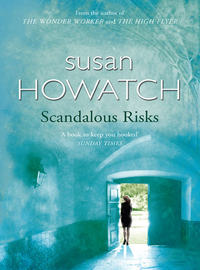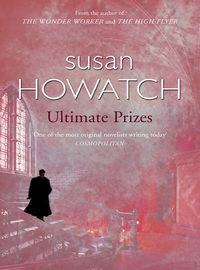
Полная версия
Glamorous Powers
‘I’ve kept all the copies of The Times for you, Father,’ said my admirable prior, welcoming me warmly in the hall. ‘I thought you might have been too busy in London to read the newspaper.’
I refrained from telling him that Francis had not offered his copy for my perusal. Reading a newspaper would have constituted intolerably frivolous behaviour for a monk who was supposed to be concentrating on his spiritual problems.
My relief that I was home expanded into pleasure. My best men were all so glad to see me and even the sulkiest drone achieved a smile of welcome. After dinner I briefly interviewed my officers, attended to the most urgent correspondence, dealt with a couple of domestic matters and toured my five-acre domain of flowers, vegetables, fruit-trees, herbs and bee-hives. In the herb-garden the cat came to meet me and I picked him up. A black cat with a white spot on his chest he had been called Hippo after St Augustine’s city, and was a dull affectionate animal like the drone who was responsible for his welfare. After stroking the fur behind the ears I set the creature down again but he was captivated; he padded after me as I completed my tour of the garden and even mewed in protest when I eventually shut the back door in his face.
The bell began to toll in the chapel. I displayed myself in choir, but suddenly as I savoured my happiness that I should once more be worshipping God in my familiar place, I remembered my new call and shuddered. How could I bear to leave? My happiness was at once displaced by misery.
However in my own home I found it easier to regain my equilibrium. Reminding myself that my departure was by no means certain I spent some time reading (the accumulated copies of The Times were a great solace) and later made a satisfactory attempt at meditation. When I returned to my cell after matins that night I was tired enough to feel confident that I would fall asleep without difficulty, and indeed as soon as I had closed my eyes I felt my mind drift free of the fetters which I had subconsciously imposed upon it during the difficult week I had spent in London. I began to dream.
XIII
I dreamt of Whitby, proud arrogant Whitby, who had stalked through the backyard at Ruydale with his tail pointed triumphantly at the sky. Prowling prancing Whitby, living in his monastery but padding off to the nearby hamlet whenever the celibate life became too uncomfortable, clever cunning Whitby, a little battered and scarred like all successful tomcats but still as striking as a racy buccaneer, tough tenacious Whitby who worked hard and deserved his pleasures, lean lithe Whitby, wonderful Whitby – what a cat! Whitby was walking through my dream towards me but suddenly he faded into a black cat, not Hippo of Grantchester but Chelsea, my mother’s favourite cat, serene elegant Chelsea who washed her paws so fastidiously on the hearth. My mother was there too, serene and elegant just like Chelsea, and she was talking to me without words, saying everything she was too reserved to say aloud and making me feel so sorry for my father who was excluded from these conversations because he was unable to hear us in our silence. ‘How lonely you must be with him!’ I said to my mother in my dream, but she answered: ‘No, I have you and Chelsea.’
‘My own children can’t hear me when I talk to them,’ I said to her, and in my dream time was abruptly displaced because my mother had never lived to see her grandchildren. ‘The cat can’t hear either.’ And as I spoke I saw the stupid ginger cat, my children’s cat whom my daughter Ruth had named Goldilocks – which was a ridiculous name for a cat although I had never said so – but whom Martin, enrapt by different fairy-tales, had always called Pussy-Boots. In my dream Betty was slopping some milk into a saucer for the cat and as she stooped I could see past the open neck of her nightgown. ‘You look like a cat facing a bowl of cream!’ she said laughing, and as I took her in my arms the ginger cat watched us, a stupid cat, not trained to be clever, but unfortunately I was away too much at sea to ensure his education.
‘You’re going to talk to me about that cat,’ said Father Darcy, walking into the scriptorium at Ruydale, and suddenly there was Whitby, proud arrogant Whitby, leaping through the window with an exuberance which made the novices laugh, and Aidan was saying: ‘I’m not sure I understand; I’m not even sure I want to understand; but whatever’s going on must stop.’
Then in my dream Ruydale dissolved into London and I was searching the Fordite headquarters for Father Darcy. I searched every room, floor after floor, but he had disappeared and finally I had to confess to Aidan: ‘I can’t go on without him. It’s too difficult.’ But before Aidan could reply in walked Lyle Ashworth, small and slender in an open-necked nightgown, and as she lay down on the bed I turned to Aidan to say: ‘I lied to Francis – I did have an erection after all,’ but Aidan had vanished and when I turned back to the bed I found that Lyle had been replaced by Betty. Betty had taken off her nightgown and the next moment I was consummating my marriage, sunk deep in the folds of the most exquisite pleasure, and yet all the time I was so lonely, so isolated, so ravaged by unhappiness and despair –
I woke up sweating.
The room was filled with the dawn light. For some time I prayed for the further revelation which would validate and clarify my vision of the chapel, but no message imprinted itself on my mind and at last, rising reluctantly from my knees, I trudged to the basin to shave.
XIV
I shall not record the mental torment of the next four weeks as I examined each of my interviews with Francis and lurched from confidence to doubt and from despair to hope. Suffice it to say that I meditated on my crisis as conscientiously as I could and somehow, amidst bouts of the most crippling anxiety, contrived to present a semblance of normality to my community as I went about my daily work. Day after day I prayed for a further divine communication, but God, the utterly transcendent God of Karl Barth’s repellent anti-mystical theology, appeared to have withdrawn from that scrap of finite time in which my soul was imprisoned and no matter how hard I prayed for a manifestation of his immanence I was disappointed.
In Europe God also appeared to be absent. The Germans slaughtered thirty thousand people in Rotterdam, bombed the Channel Islands and abolished the famous motto of France, ‘Liberty, Equality, Fraternity’. In their shock and fear the British seemed to find such events almost impossible to digest; they twittered about tea-rationing (my drones were very cross) and talked righteously about the evils of the ‘chatterbugs’ who threatened the national security by their gossiping. But we all listened to Churchill with a new intensity. I fell into the habit of reading aloud his speeches, printed in The Times, to my men after breakfast; the national peril was so great that I did not think it right that they should be obliged to wait a full week before hearing the news in the Saturday recreation hour. Monks may live apart from the world but they do not reject it, and day after day we prayed for all those whose lives were being ravaged by the war.
However I was eventually diverted from this urgent work by the inevitable summons from Francis. Three weeks after my return to Grantchester I received a communication which read: ‘Please confirm that you will return to London on Monday to re-examine the matter which we discussed last month,’ and at once I sent an obedient message in reply.
The most arduous part of my ordeal was now confronting me.
I began to steel myself for the inquisition.
XV
‘So here we are again,’ drawled Francis, ‘in spite of Hitler’s attempts to interrupt us. I suppose that if the Germans invade they’d shoot all monks on sight? Atheistic Nazism combined with the German folk-memory of Luther’s repudiation of religious orders certainly doesn’t encourage optimism on the subject.’
‘At least you’d be spared the ordeal of interrogating me.’
‘So I would. But perhaps I’m to be spared it anyway. Have you finally succeeded in taking your mind out of those mystic mothballs and deciding your vision was a delusion?’
‘I’m sorry but –’
‘No, don’t bother to apologize. I never seriously allowed myself to hope that you’d walk in here, prostrate yourself at my feet and announce: “I was deluded.”’ Francis swept back his mane of silver hair and allowed himself a theatrical sigh of resignation. Then he said curtly: ‘Very well. Come back at four this afternoon and I’ll start the task of taking you apart.’
FOUR
‘St John of the Cross even said of a nun who claimed to have had conversations with God: “All this that she says: God spoke to me; I spoke to God, seems nonsense. She has only been speaking to herself.’”
W. R. INGE
Dean of St Paul’s 1911–1934
Mysticism in Religion
I
‘Before I wheel on the rack,’ said Francis when we met five hours later, ‘I must give you the chance to rebut all the insinuations I made during your last visit, but please, Jonathan, please don’t offer me any fey mystical claptrap. I want rational propositions from you, not romantic waffle. Now first of all, what makes you think this vision was real and not a fantasy triggered by an emotional disturbance?’
Without hesitation I said: ‘Apart from the north light at the end there was no obvious distortion of reality – no six naked women, as you put it, dancing in the glade. If the vision had been triggered by a sexual difficulty I feel some form of sexual symbolism would have shown up.’
‘What about the rich woman’s bag?’
‘I don’t believe that was a sexual symbol. If it were then I suspect the lid would have been open to reveal a feminine garment such as a nightgown.’
‘Very well, but let’s stay with the subject of your sexual difficulties. I concede there was no sexual symbolism in the vision but that might have been because you’d obtained physical relief earlier that night. How can you be sure that the vision wasn’t triggered by a far more complex sexual malaise arising from a disintegrating adjustment to the celibate life?’
‘Primarily because I’ve been through much worse times without any vision being triggered. The truth is this difficulty with my celibacy wasn’t as bad as you’re trying to make out.’
‘And Mrs Ashworth?’
‘With all due respect I think you should guard against turning that particular molehill into a mountain. Obviously I find the woman more attractive than I want to admit and obviously I’ve been protecting myself from that weakness by stressing my dislike of her, but I’m not in love with the woman, I’m never likely to be in love with her and such attraction which exists is only of the most trivial kind.’
‘So might the ageing Antony have said when he saw the still youthful Cleopatra – but I take your point. And now we’ve reached the subject of ageing let me ask you this: why are you so sure that your current crisis isn’t the result of your panic when you awoke on the morning of your sixtieth birthday and realized old age was staring you in the face?’
‘There was no panic. I’m a mature man, not an elderly adolescent clinging to a lost youth! I admit I disliked the idea of being sixty, but what’s so abnormal about that? You yourself admitted that you spent three days sunk in gloom after your own birthday this year – how are you enjoying being sixty years old?’
‘Well, as a matter of fact,’ said Francis, ‘I’m now enjoying myself immensely. But I dare say that’s because I’ve been fortunate enough to acquire this fascinating new career as the Abbot-General.’
Conversation ceased. As Francis caressed his spectacles languidly I was appalled to realize that my fists were clenched. Surreptitiously I relaxed my fingers one by one.
‘Congratulations!’ I said at last. ‘That was a neat twist of the thumbscrew. Are we reaching the point where you wheel on the rack?’
‘Let’s first see how well you defend yourself against the charge that you’re attempting to storm out of the Order in a fit of pique because you failed to become the Abbot-General.’
‘I’m neither a fool nor a bad monk. I’ve got enough brains to see I’d be very miserable here in London, and I’d never request to be absolved from my vows out of mere injured pride.’ I hesitated but when Francis remained silent I added: ‘For seventeen years I’ve had the strongest possible call to the cloister, and on the one occasion ten years ago when I really did long to leave my longing had nothing to do with my lack of preferment. On the contrary, at the time of the Whitby affair I’d just been made Master of Novices and my future in the Order was rosy.’
‘But on that occasion you had Father Darcy to steer you through the crisis to safety – and that brings us to the next point: how do you deny the charge that this vision is simply a spiritual aberration brought on by the loss of your mentor?’
I had long since decided that I had no choice but to grasp this particular bull by the horns. ‘I could only rebut that charge by proving there’s nothing wrong with my spiritual health,’ I said, ‘and since we both know that my spiritual health has recently been impaired by emotional stress, I can’t offer a water-right defence. All I can say is that it never once occurred to me that I couldn’t survive in the Order without my spiritual director. Think of my pride! What would Father Darcy have said if I’d chucked in the sponge in such a pusillanimous fashion? No, of course I had to go on. There was no choice.’
There was a silence while Francis began to polish his spectacles on the skirt of his habit. I could not decide whether he had no idea what to say next or whether he was trying to rattle me by keeping quiet.
‘I suppose,’ I said to show him I was unrattled, ‘you now want me to say something about Martin.’
‘You’re inviting me to wheel on the rack?’
‘No rack’s necessary. I’m willing enough to talk – and willing enough to concede that he thoroughly upset me. In fact I’m even willing to concede that he could have triggered the vision. But I don’t think he did, and I’ll tell you why: if he’d been the trigger I believe the vision would have been different – for instance, I’m sure he would have appeared in it, just as Charles Ashworth appeared in my vision of 1937. And there’s another point which is important here: why should Martin’s problems make me want to leave the Order? Even if I were in the world I could do no more than pray for him, and I can do that equally well in the cloister.’
‘True. But this is where we wonder if you’re subconsciously longing to rebel against old age and wipe out your disillusionment with Martin by taking a young second wife and begetting the ideal son.’
‘You can’t seriously think I’d be quite such a fool!’
‘Fortunately for the human race matrimony and procreation aren’t confined to fools.’
‘Yes, but to embark on both at the age of sixty when I know I can serve God best as a celibate –’
‘Why shouldn’t God now wish you to serve him as a married man?’
‘But I’ve had no indication of that!’
‘You’ve had no indication of anything! All you’ve experienced is this mindless urge to leave the Order, and it’s quite obvious that this could have been triggered by one or more of a number of circumstances –’
‘There was no trigger.’ I tried not to raise my voice but failed. ‘This vision came from God!’
‘You still have no doubts about that?’
‘Absolutely none!’ I said with a dogmatism guaranteed to inflame any superior past endurance.
‘How arrogant!’ exclaimed Francis. ‘How wholly lacking in humility! How utterly devoid of any willingness to admit you could be wrong!’ As he stood up I too rose to my feet and we faced each other across his desk. ‘Go to your cell,’ said my superior, ‘and don’t come out of it – unless there’s an air-raid – until you’re due to return here at four tomorrow. I find your attitude profoundly unedifying.’
‘Yes, Father.’ Walking out I somehow resisted the temptation to slam the door.
II
I wondered if he intended me to fast, but my supper arrived on a tray and later Ambrose appeared, inquiring about my health. Evidently Francis was taking no chances with my mental equilibrium by allowing me to slide into physical debility.
The knowledge that I had deftly repelled Francis’ efforts to undermine my confidence was very cheering; settling down to enjoy my solitary confinement I read, meditated, prayed and retired to bed in a mood which could almost be described as complacent.
However my complacency began to fade when I returned to his office on the following afternoon and was obliged to wait outside the door for ten minutes before he gave me permission to enter. Such a petty exhibition of power I found very irritating and my irritation increased when he ordered me into the room only to keep me standing in front of his desk while he finished writing a memorandum. I was beginning to seethe with anger when I realized that any loss of temper would constitute a victory for him, and at once I willed myself to be calm.
Eventually he motioned me to sit down. Then he said abruptly: ‘Now listen to me. There are two things I want to make clear. Number one: I’m convinced this vision of yours had a trigger. And number two: the existence of a trigger doesn’t necessarily imply the vision didn’t come from God.’
I assumed what I hoped was my politest expression and said nothing.
‘You believe,’ pursued Francis, ‘that in order to prove this vision’s from God you must maintain that it has no connection with anything which was going on in your life at the time. However I’m now certain that this approach is erroneous.’
Still I said nothing, but I was aware that my polite expression was becoming strained.
‘I’m not denying that God’s capable of sending people visions out of the blue,’ resumed Francis, ploughing on purposefully. ‘All I’m saying is that I don’t think this is likely in your case, and I say that because, as you reminded me yesterday, your call to the cloister was so strong. I think God would have had to prepare the ground before he gave the blast on the trumpet; otherwise you would have been either deaf to the blast or convinced you were mistaken. So from the point of view of discernment the crucial question becomes: what was the vision’s final trigger? I think that once we can answer that question we’ll be a lot closer to solving this mystery.’
By this time I had given up trying to look polite and was concentrating on achieving a meek expression.
‘Jonathan, I find it unnerving when you give a bravura performance of the model monk. Could you please stop acting and venture a comment which isn’t entirely lacking in honesty?’
‘I find your opinions very interesting, Father, but I can’t help wondering if you might be mistaken. If a final trigger had existed I’m sure I’d be able to identify it.’
‘How typical!’ said Francis in disgust. ‘You think you can do anything, don’t you – even read your subconscious mind! It never occurs to you in your arrogance that your subconscious mind may be beyond the reach not only of your intellectual powers but of your tiresome psychic powers as well!’
‘Well, of course I’m as capable as anyone else of suppressing a truth I’ve no wish to face, but all I’m saying is –’
‘All you’re saying is that you intend to be as arrogant and obstinate as ever! Very well, let me now ask you the question I would have asked yesterday if you hadn’t driven me into losing my temper: during your month of reflection at Grantchester did you receive any further enlightenment on the subject of what this call’s all about?’
‘No. But I’m convinced that if I leave the Order I’ll be led to the chapel, and once I get there –’
‘Stop!’ Francis held up his hand. Then he said incredulously: ‘Can I possibly have misheard you? Is it conceivable that you seriously believe you’ll be led to this place? You imagine a latter-day Star of Bethlehem will be hanging over the chapel, perhaps, to guide you on your way?’
‘No, Father. All I’m saying is –’
‘That’s enough! Be quiet!’
Silence. I folded my hands together and waited.
‘I can see it’s a complete waste of time talking to you at the moment,’ said Francis. ‘I’m beginning to think old age has softened your brain. Go to the workshop and ask them if they can let you have some wood to play with. When people are mentally disturbed they’re often encouraged to work with their hands.’
‘Yes, Father.’ I did succeed in making a dignified retreat but I could not help thinking as I left the room that this time Francis had fared far better in the interview than I had.
III
In the workshop where four monks made church furniture I introduced myself to Edward the master-carpenter, and informed him that I had been ordered to work with wood. He looked incredulous. Manual labour is encouraged at all levels of the Order and I did my share of gardening alongside my brethren at Grantchester, but nonetheless an abbot is hardly expected to seek work as an artisan.
‘I was trained by Alfred at Ruydale,’ I said.
Edward became deferential. ‘What would you like to do, Father?’
I did not answer the question directly but said: ‘Is it too much to hope that you’ve got some seasoned oak to spare?’
He had the oak. It seemed like a sign. With the wood in my arms I moved in exhilaration to the work-bench and embarked on my first carpentry assignment for ten years.
IV
‘I hear you’re making a cross,’ said Francis the next day. ‘Amusing for you. How long will it take?’
‘Longer than it should. I’m out of practice.’
‘What’s so difficult about making a cross?’ said Francis, deliberately provocative. ‘Can’t you just bang a couple of bits of wood together?’
‘No, Father. I have some very beautiful oak and I want to make the cross out of that one piece, taking every chance to display the grain of the wood to its best advantage.’
‘Well, I suppose that’s all very soothing for your equilibrium-maybe I should take up carpentry myself. I’ve got a novice hearing voices, a visiting bishop who’s in a muddle about pacifism, four young shirkers who swear they’re called to be monks, Harrods trying to sell me something called a radiogram instead of a modest wireless, twenty unanswered letters requesting advice on topics ranging from the sublime to the ridiculous – oh, and I nearly forgot! An abbot whose psychic powers are running riot! When you return to your cell, Jonathan, go down on your knees and thank God you were spared the ordeal of being Abbot-General.’
‘Yes, Father.’
‘Very well, go away, I’m too busy to bother with you at the moment. I’ll send for you in a day or two.’
Exerting an iron will to control my temper I retired once more to the workshop.
V
‘I hear you’ve finished the cross, Jonathan. Of course it’s a replica of the cross you saw in your vision, so I suppose all you now have to do is build the chapel, isn’t it? Then I can shine a torch through the north window and you can claim a miracle.’
‘That’s right, Father. But before I build the chapel I was hoping we could resume our talks.’
‘Getting impatient? Patience is in many ways the most difficult of all virtues, Jonathan, and one which I feel it would pay you to cultivate.’
‘Yes, Father.’
‘Perhaps you might have another vision while you wait. It would pass the time.’







